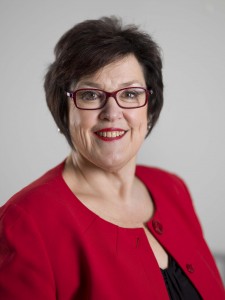For Sandie Keene, Past President of the Association of Directors of Adult Social Services, the highlight of this year’s NCAS conference will be the launch of the Commissioning for Better Outcomes framework – a sub plenary to be held on Thursday morning at 10.35am in the main auditorium.
I’m pleased to be speaking at the session alongside colleagues from the Department of Health, the Health Services Management Centre (HSMC) at the University of Birmingham and the National Co-production Advisory Group who, alongside care provider and local authority representatives, have taken part in a truly collaborative process to develop this ambitious set of standards for good commissioning of adult social care.

The outcome – to use an apposite word – is an impressive practical outcome-focused and person-centred framework for self-assessment and peer challenge to support local authorities to assess how well they are doing and identify if there are things they need to do to raise their game.
The Local Government Association (LGA) are developing protocols for using the framework under the sector led improvement initiative and we are looking forward to starting the piloting later this year.
The framework sets out 12 standards of what good commissioning looks like:
1. Person-centred and focused on outcomes
2. Promotes health and wellbeing
3. Delivers social value
4. Coproduced with local people, their carers and communities
5. Positive engagement with providers
6. Promotes equality
7. Well led
8. A whole system approach
9. Uses evidence about what works
10. A diverse and sustainable market
11. Provides value for money
12. Develops the workforce
Of course, the standards will evolve over time to incorporate new good practice as it emerges and take account of innovations in areas such as integrated commissioning.
ADASS are delighted to be sharing the NCAS session with Wiltshire County Council and the homecare provider Mears who will be talking about their unique scheme: Help to live at home, an innovative outcome-based, preventative approach to homecare and reablement.
Do come along to this NCAS session to find out more about the standards, about the innovative commissioning model in Wiltshire and participate in a debate about the barriers to outcome-based practice. And of course, be one of the first to get your hands on a copy of the commissioning for better outcomes framework.
Further information:
Commissioning for better outcomes: Thursday 30 October 10.35 – 11.35am
Follow the conference on twitter: #NCASC14
2 comments
Comment by Pearl Baker posted on
Having just responded to the 2014 Health Select Committee 'accountability hearing with the MONITOR' it raises the profile of the MONITOR, responsible for financing Commissioners of Health, while at the same time, monitoring the 'integration' of Health and Social Care. Could there be a conflict of interest here!
The MONITOR says 4.2 How will provider regulation and continuity of services enable integrated care?
'The continuity of services regime recognises the complexities of integrated care. However, it is commissioners, supported by NHS England, who will have primary responsibility for ensuring the continuity of services provision. This includes deciding how best to integrate services around patients' needs and preferences.
5. 'What is MONITOR doing to ensure the payment system supports the delivery of integrated care?'
The whole system should be based around the patients health and care needs, including that of their carer.
At present we have a system that is spasmodic to say the least. many patients do not have any Care Plans.
Who should be responsible for monitoring an 'integrated' system of health and social care.
The CQC should monitor more closely that of the mentally ill, when Inspecting GP Practices. Section 117 is part of the MHA 1983, but there are currently no checks, as to whether these services are implemented as per the Care Act 2014. No integration here.
The MONITOR is acting as a Banker, and Provider, and we all know what that means.
5.1 'What is Monitor doing to ensure the payment system supports the delivery of integrated care?
The MONITOR is actually doing nothing, he cannot, he has no means of knowing if an 'integrated' service is being delivered to those individuals who need it, or require it.
'Integrated' health and social care is a great concept, but undeliverable if you have no idea how to deliver, or how to monitor the delivery of it.
Comment by felix ugwumadu posted on
A good social work will always focus on the twelve standards as a measure of good practice. However, social work has now been polarised by both capital and small P (Politics), which has to some degree demeans personal social service. It is good to talk about personal social work and associated changes, which brings to light a contemporary social work that promotes health care and social Wellbeing. Social work in itself is about making a significant change to people's lives, supporting those individuals to improve their Wellbeing. It also helps to prevent dependency culture and reduces long term costs on curative diseases.
Social work has seen a number of changes in recent times yet, social work still lacks behind other professional bodies because of political interferences: from all political persuasions. The professionals should be given the opportunity to practice social work otherwise, it is worthless mentioning or brandishing the twelve social work standards. This is purely academic rhetoric which has neither substance or conviction in social work practice of modern era. These standards have long existed in social work education and have only served its purpose in social work training, enriching our knowledge when in the university. It is evident in practice, political directives have eroded the apparatus of good social work that are coined around holistic social work standards and behaviours.